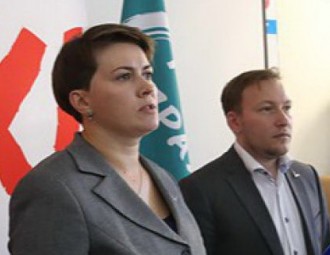Radio Liberty: Tatsiana Karatkevich defends candidacy in landslide presidential poll

The lone opposition candidate in president election has defended her decision to run against authoritarian President Lukashenka despite criticism that her candidacy may be used to legitimise election.
Tatsiana Karatkevich, an activist with the “Tell the Truth!” movement, said on October 22 that ignoring the election that Lukashenka won in a landslide would have made the opposition look no better than the government in the eyes of voters.
"We see how authorities today are actively ignoring the population and not respecting them," Karatkevich, who finished second with an official vote tally of 4 percent in the October 11 election, told a briefing at the Wilson Center, a nonpartisan research group based in Washington.
Lukashenka, who has ruled the former Soviet republic since 1994, was reelected to his fifth term as president in the election with 83.5 percent of the vote, according the Central Elections Commission's official results, which Karatkevich said she considers invalid.
Lukashenka's political opponents have dismissed his reelection as a farce, and the Organization for Security and Cooperation in Europe (OSCE), which monitored the poll, said the election made it "clear that that Belarus still has a long way to go towards fulfilling its democratic commitments."
Prominent opposition figures in Belarus had urged Karatkevich to bow out of the race over fears that Lukashenka's government put challengers on the ballot merely to create a veneer of democracy in the tightly controlled former Soviet republic of 9.5 million.
But Karatkevich told the October 22 briefing that "a majority of Belarusians" see only "depressing prospects" when looking ahead to the future, and that political involvement can give them hope.
"Active participation in any civic or political actions gives them fresh hope that they can achieve what they want," she said.
'Lack of transparency'
The country's previous presidential election, in December 2010, ended with the violent dispersal of protesters by security forces and the imprisonment of several activists and presidential candidates.
No similar unrest erupted in the aftermath of this election, prompting the European Union to take a step toward temporarily suspending sanctions against Belarus despite concerns about the poll.
The two other candidates in the election were both from pro-government parties and congratulated Lukashenka before any official results were announced.
The OSCE said Lukashenka's government created "an uneven playing field" in the election, an assessment echoed by Karatkevich, who complained of restricted media access during her campaign.
At Karatkevich's October 22 briefing, the Charge d’Affaires of the Belarusian Embassy in Washington, Pavel Shidlovsky, was given the microphone and offered praise that could serve as ammunition for critics who say her candidacy helped legitimize an unfair election.
"I'm really glad that Tatsiana Karatkevich is here with us today, and I think, it is my opinion, that she conducted her campaign with grace and dignity, and I'm sure that she added a dignity and decency to the presidential campaign in Belarus," Shidlovsky said.
The diplomat also recounted several of the OSCE's more generous assessments of the ballot, including Lukashenka's release in August of "the remaining internationally acknowledged political prisoners" and a "peaceful" campaign and election day.
Mitchell Polman, an OSCE observer who monitored the election, later took the microphone and responded to Shidlovsky's comments, noting that the organization also offered "strong" criticism of the election.
"It was also a very strong statement that criticized the election for a lack of transparency in the counting process, as well as the lack of representation of candidates and political parties on the elections commissions," Polman said.
Polman added: "On a personal level, I've observed in about 12 or 13 countries. I have never seen a counting process that lacked transparency to the extent that it did in Belarus. No question."
-
03.01
-
07.10
-
22.09
-
17.08
-
12.08
-
30.09








































